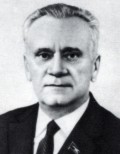 |
Nikolaj Aleksandrovich Tikhonovb. 1 [14] May 1905, Kharkov, Russian Empire |
| Title: | Председатель Совета Министров СССР (Chairman of the Council of Ministers of the USSR) |
| Term: | 23 Oct 1980 - 27 Sep 1985 |
| Chronology: | 23 Oct 1980, appointed, resolution passed by the 4th session of the 10th Supreme Soviet of the USSR [1] |
| 27 Sep 1985, discharged, decree of Presidium of the 11th Supreme Soviet of the USSR [2] |
| Biography: | |
Born in a family of Russian engineer, Nikolaj Tikhonov also chose a career of engineer after he graduated from the Dnepropetrovsk Metallurgical Institute (1930). From 1930 to 1941, Tikhonov worked for the Lenin Metallurgical Plant in Dnepropetrovsk until he earned a promotion as the plant's senior engineer. In these pre-war years, he met the future Soviet leader, Leonid Brežnev, who occupied a number of party and state posts in Dnepropetrovsk in 1937-1941. In September 1940, Tikhonov joined the Communist party and soon was transferred to the Novotrubny plant. In Jul 1947 - Dec 1950 he headed the Yuzhnotrubny plant in Ukraine as director. His experience in pipe industry helped him receive a position in the Ministry of Ferrous Metallurgy of the USSR in the capacity of a department head (Dec 1950 - Sep 1955). Later he was promoted to deputy minister in the same ministry (Sep 1955 - May 1957), but the administrative reforms of Nikita Hruščëv created provincial economic councils and Tikhonov was sent to head such council in the Dnepropetrovsk region (May 1957 - Apr 1960). He returned to the Soviet capital to serve in the State Scientific and Economic Council (Apr 1960 - Nov 1962). In this period he was elected on the party Central Committee as a candidate member (1961-1966). In March 1963 Tikhonov became a deputy chairman of the State Planning Committee of the USSR. After Brežnev became party leader in Oct. 1964, he helped promote Tikhonov to the post of deputy chairman of the USSR Council of Ministers (2 Oct 1965 - 2 Sep 1976). The 23rd party congress elected Tikhonov a full member of the Central Committee (1966-1989), but he remained out of the party leadership throughout the 1970s. Apparently, Brežnev favored Tikhonov's approach to work as loyal functionary, who unlike the Soviet premier Aleksej Kosygin preferred to follow the decisions of Politburo rather than to draft his own schemes of economic development. In 1976, Tikhonov was appointed one of the two first deputy chairmen in the Soviet government (2 Sep 1976 - 23 Oct 1980). When his colleague, Kirill Mazurov, was forced to retire in November 1978, Tikhonov became the only first deputy chairman and took a seat in the Politburo as a candidate member (27 Nov 1978 - 27 Nov 1979). Within a year, he was promoted to full membership in the Politburo (27 Nov 1979 - 15 Oct 1985). Finally, he was approved as the Chairman of the Soviet government on 23 Oct 1980. The response of the Tikhonov government to the needs of reforming the Soviet economy was ineffective. He retained his post after the death of Brežnev and during the brief administrations of Yury Andropov and Konstantin Černenko, but the election of Mihail Gorbačëv to the post of General Secretary in March 1985 signalized the end of Tikhonov's career. He resigned the post of premier in September 1985 for reasons of advanced age. Biography source: [3] |
|
| | |
| [1] | Ведомости Верховного Совета СССР, 1980, № 44, Ст. 912. |
| [2] | Ведомости Верховного Совета СССР, 1985, № 40, Ст. 751. |
| [3] | Государственная власть СССР. Высшие органы власти и управления и их руководители. 1923-1991 гг. Историко-биографический справочник / Сост. В.И.Ивкин. М.: РОССПЭН, 1999, |
